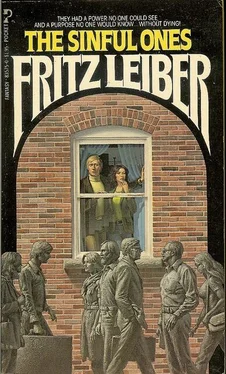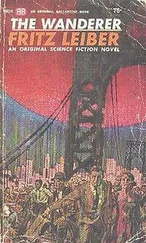He wasn’t fifty feet from the corner—in fact he had almost entered the pool of light under the last street lamp—when he saw Marcia. She was wearing a dark dress with a white flower pattern. She was carrying a square black handbag. She turned north toward her apartment.
Carr stood still. There was the person he most wanted to see, but now that he’d fond her, he hesitated. Just as with the little old man passing the apartment steps, something held him back from making the move, from speaking the word that would relieve him.
He watched Marcia cross the street, walk into the pool of light on the other side, walk out of it.
He still hesitated. He felt a growing agitation. He looked around indecisively.
His glance took in a figure standing across the street, its slim, college boy form and cropped hair silhouetted by the bright glow of the scalloped lights, its face in shadow.
There was something familiar about the man. Carr automatically stared him, trying to recall where he’d seen him before.
The man glanced behind him as if to reassure himself that Carr wasn’t looking at someone else. Then he turned back. There was a tiny flash of white from the lower part of his shadowed face, as if he had shown his teeth in a smile. He waved to Carr jauntily.
As he did so, Carr realized that he did want to be with Marcia, walking at her side, in his proper place, accounted for, not alone in this dreadfully empty city.
For only a bit of hooked metal came out of the upraised cuff across the street.
Everything stood out sharply as an engraving to Carr. He knew without counting that there were sixteen bulbs in each of the scallops, that inside the bar were walls stenciled with nymphs and satyrs, three nymphs and two satyrs to each panel, that the wide sidewalk in front of the bar was divided crosswise into blocks of three.
The handless man started toward him, entreating him to wait with another jaunty wave.
Carr pretended not to see. He turned north. Marcia was a small silhouette a quarter of a block away. He started after her at as brisk a pace as might still seem natural.
“Hold on a moment, would you?” The handless man called after him. The voice was rather high, but cool and pleasant, with an Eastern accent.
He knew he must not answer. Once give them proof that he was alive—
He pretended not to hear. He gained the opposite curb, thankful that an approaching car had allowed him to lope for a few steps.
“Stop a minute, please,” the handless man called. “There’s something I want to tell you.”
Carr’s gaze clung to Marcia’s flowered dress. Thank God, she was walking slowly. He went through a little pantomime of recognizing her, to justify a further increase in his pace.
“Please stop,” the handless man called. “I’m sure I know you.”
It was a dark stretch. The apartment Carr was passing boasted a hedge. Parked cars, gleamingly washed but filled with gloom, made another wall.
The footsteps behind him were gaining. Marcia was still some distance off. Carr fought to keep from running.
“You’re not very polite,” the handless man called. “After all, I’m a cripple, though it doesn’t slow me down.”
The footsteps were very close now. Although Marcia was hardly twenty feet away, it seemed to Carr that there might as well be a trench deep as the world between him and her.
The footsteps were just behind him. A toecap flicked the lower edge of his field of vision. A voice said in his ear, “Do stop now,” and he felt his shoulder brushed by something like a talon.
Carr darted forward a few steps, slide his arm around Marcia’s and said in as gay a voice as he could manage, “Hello, dear!”
Marcia did not turn her heard. Not by the slightest break in her stride did she betray that she was aware of his existence. Even her arm, under his hand, was like a stick of wood.
The other footsteps dropped back a little.
“Please don’t cut me,” Carr whispered urgently. “I know how you feel about the way I behaved last night, but I can explain.”
She turned, pulling away from him. He realized they had reached her apartment hotel.
The footsteps behind him speeded up.
Carr followed her up the walk. “I must come in with you.”
Still she did not recognize his presence. She jerked at the door before he could reach it. He ducked through after her.
They crossed the lobby together. The clerk was leaning on the counter, chin in hand, so that his gold seal ring gleamed and his coat sleeve fell back, exposing the gold cuff link.
His eyes ogled them. He opened his mouth—there was the flash of a gold filling—and said, elaborately, “Good evening, Miss Lorish.”
“Good evening,” said Marcia, curtly.
Carr heard the door open and close behind them. Then the footsteps, crisp on the tiling, soft on the carpeting, swiftly over-taking them.
The elevator was waiting. Marcia stepped in and jabbed quickly at the seven button. Carr barely slipped through as the door started to close. Swiftly turning, he saw a hook blotted out by the closing door. The cage started up.
Carr felt a surge of partial relief, but then instantly the bigger fear closed in.
Marcia was ignoring him so utterly. She hadn’t given him a single sign. As if, behind that beautiful impatient face, there was nothing, absolutely nothing…
No, that couldn’t be true, he told himself. Mustn’t be—not with her so close and the two of them locked in this little cage.
And as for Marcia, she was just being cruel. There’d been times before when she’d ignored him as a punishment.
“Darling,” he began.
The cage stopped. Marcia jerked at the door and darted out. Carr hurried after her down the hall.
Marcia had her key out and the door to her apartment open in a single movement. The latter was almost slammed in Carr’s face.
She must be aware of him, or she wouldn’t be acting this way, he tried to assure himself as he pushed in after her. Her quick, angry movements pointed at her realization of his presence.
“Marcia, please stop acting so childish,” he managed to say.
She tossed her handbag in a chair, hurried into the kitchen. He started after her, hesitated, moved around nervously.
She came out of the kitchen. She had a highball in her hand.
She set the drink down on the small table at his elbow, and went on into the bedroom.
Carr could hardly realize it for a moment, his relief was so great.
She was aware of him. Bu that simply action she’d admitted his presence.
All the rest of her behavior had been just temperament, her peculiar captiousness.
He picked up the drink and took a grateful gulp.
But as he did so, he noticed a piece of notepaper near it, covered with Marcia’s handwriting.
His own name was at the top.
Transferring the drink to his other hand, he picked it up.
Dear Carr:
I recognized the power in you, Carr, the fiery cleverness, the talent for the grand gesture. But you would not use them. You could have been a prince. But you chose to be a hireling. Many times I guided you into situations where you would have the opportunity to find your real self. Again and again I got only the equivalent of a slap in the face for my pains. I was patient. I knew you’d been in a rut for a long time and I made allowances. But this last incident was too much for me. When you coldly turned down Keaton Fisher’s magnificent offer—the offer of a man who has got to the top with no more ability than you, without your looks, and in spite of a lot more hindrances than you’ve had to cope with—when I watched you rudely reject that man’s generous offer, I knew it was the end of things between you and me.
Here’s a word of advice, if in the future you should ever decide that you’re tired of being a hireling and would like to attempt the bigger role. If you want a woman to think you a prince, you must act like a prince in all ways. If you want to be with big people, you must be a big person. If you want life exciting and dangerous, you must be the size of danger and excitement.
Читать дальше









